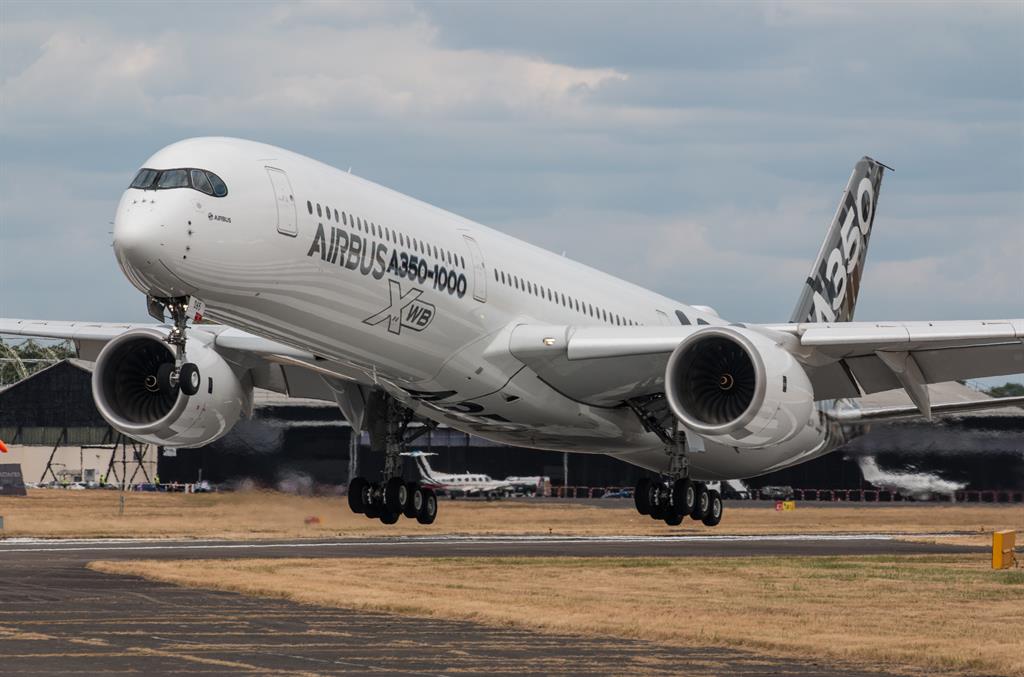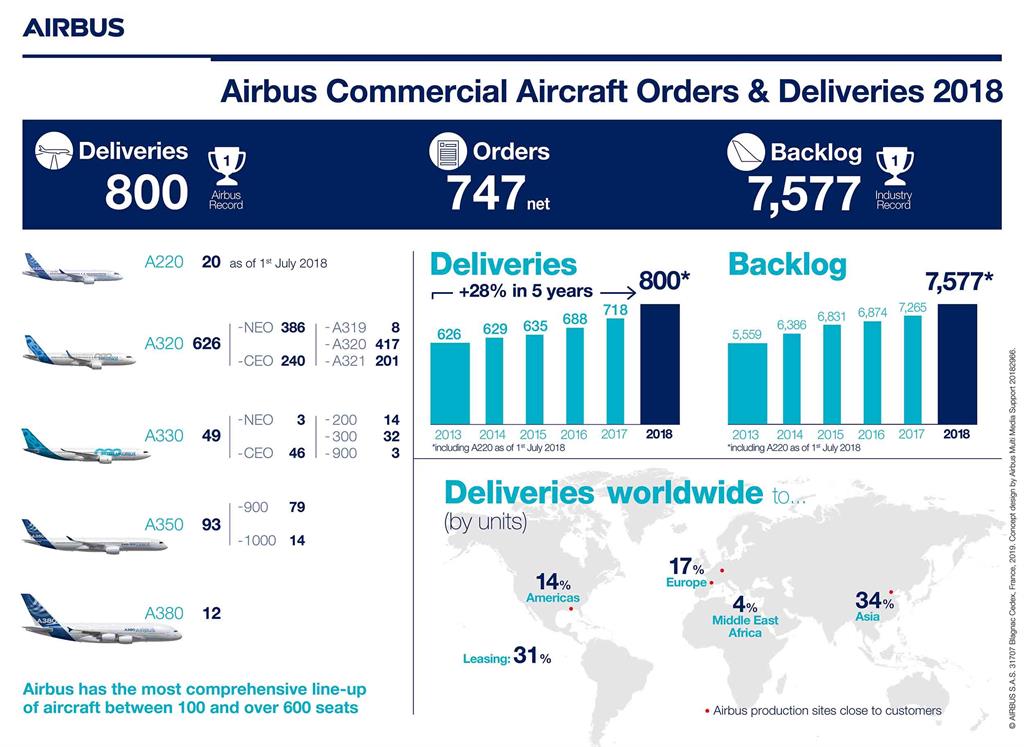Airbus loses to Boeing in annual jet order race
European aeroplane maker scoops 747 orders versus America’s Boeing with 893.
Nampa/Reuters
Airbus abandoned a five-year winning streak in the race for jetliner orders in 2018, slumping to its lowest share of the US$150 billion jet market in six years, but narrowing a gap against U.S. rival Boeing Co in airplane deliveries.
The European company said it had won 747 net orders, down 33% from 2017, despite a hefty contribution from the Canadian A220 jet which it took over in July. Boeing won the order race for the first time since 2012 with 893 orders.
Airbus delivered 800 jets, up 11%, including 20 of the small A220 model, leaving Boeing as the world's largest aeroplane maker by manufacturing volume for a seventh straight year. Although Boeing missed its delivery target and Airbus had previously lowered its goal due to strains on the industry's global supply chain, strong demand for passenger jets expanded total deliveries by 8%, the fastest pace in six years.
ORDERS SLOW DOWN
Still, investors are watching for signs that a longer-than-usual aerospace cycle is fraying amid concerns over key markets like China, even though some slowdown in orders had been expected as manufacturers digest record production backlogs.
Aeroplane making chief Guillaume Faury said Airbus had achieved a "healthy order intake", with waiting lists for many new jets stretching up to seven years.
Insiders say its quest for new business has, however, been overshadowed in the past year by industrial problems, management changes and morale problems coinciding with a corruption probe.
It also faced a challenging annual comparison after its former sales chief retired with a swan song deal in 2017 for over 400 jets that analysts said had anticipated future demand.
A resurgent Boeing has meanwhile been cashing in on greater availability and declining costs for its flagship 787 Dreamliner, while struggling to regain lost ground in the lucrative segment for large narrow-body jets above 200 seats. Highlighting the pressure Airbus has been facing in the market for high-margin wide-body jets like the 787, the European company was outsold three to one by Boeing for a second year.
MARKET SHARE DOWN
The order figures underscore Airbus's decision to take over the lightweight but loss-making Bombardier C Series aircraft, generating 135 orders worth US$12 billion at list prices.
Without that boost, Airbus took just 41% of the core market in which it competes with Boeing, the lowest since 2009. Airbus' Faury rejected the comparison, telling reporters the A220 was now "an integral part of the Airbus product range". He said Airbus had turned the corner after supplier problems sparked an end-year race to match the 800-unit delivery target.
"It has not been a walk in the park in 2018 and we hope to have a more steady industrial execution in 2019," he said. Airbus reached a targeted production rate of 10 aircraft a month for its wide-body A350, company officials said.
Among a handful of cancellations, Airbus officially recognised in its books the loss in 2014 of an order for 10 A380 superjumbos from Hong Kong Airlines, following negotiations.
The world's largest airliner is mostly dependent on Dubai's Emirates Airlines as Airbus slows output in the hope of a future upturn. Some analysts say the record backlogs of Airbus and Boeing still include dozens of other jets unlikely to be delivered, but both companies insist they only post valid contracts.
"I think we are in a healthy situation to prepare the next couple of years," Faury said.
Airbus abandoned a five-year winning streak in the race for jetliner orders in 2018, slumping to its lowest share of the US$150 billion jet market in six years, but narrowing a gap against U.S. rival Boeing Co in airplane deliveries.
The European company said it had won 747 net orders, down 33% from 2017, despite a hefty contribution from the Canadian A220 jet which it took over in July. Boeing won the order race for the first time since 2012 with 893 orders.
Airbus delivered 800 jets, up 11%, including 20 of the small A220 model, leaving Boeing as the world's largest aeroplane maker by manufacturing volume for a seventh straight year. Although Boeing missed its delivery target and Airbus had previously lowered its goal due to strains on the industry's global supply chain, strong demand for passenger jets expanded total deliveries by 8%, the fastest pace in six years.
ORDERS SLOW DOWN
Still, investors are watching for signs that a longer-than-usual aerospace cycle is fraying amid concerns over key markets like China, even though some slowdown in orders had been expected as manufacturers digest record production backlogs.
Aeroplane making chief Guillaume Faury said Airbus had achieved a "healthy order intake", with waiting lists for many new jets stretching up to seven years.
Insiders say its quest for new business has, however, been overshadowed in the past year by industrial problems, management changes and morale problems coinciding with a corruption probe.
It also faced a challenging annual comparison after its former sales chief retired with a swan song deal in 2017 for over 400 jets that analysts said had anticipated future demand.
A resurgent Boeing has meanwhile been cashing in on greater availability and declining costs for its flagship 787 Dreamliner, while struggling to regain lost ground in the lucrative segment for large narrow-body jets above 200 seats. Highlighting the pressure Airbus has been facing in the market for high-margin wide-body jets like the 787, the European company was outsold three to one by Boeing for a second year.
MARKET SHARE DOWN
The order figures underscore Airbus's decision to take over the lightweight but loss-making Bombardier C Series aircraft, generating 135 orders worth US$12 billion at list prices.
Without that boost, Airbus took just 41% of the core market in which it competes with Boeing, the lowest since 2009. Airbus' Faury rejected the comparison, telling reporters the A220 was now "an integral part of the Airbus product range". He said Airbus had turned the corner after supplier problems sparked an end-year race to match the 800-unit delivery target.
"It has not been a walk in the park in 2018 and we hope to have a more steady industrial execution in 2019," he said. Airbus reached a targeted production rate of 10 aircraft a month for its wide-body A350, company officials said.
Among a handful of cancellations, Airbus officially recognised in its books the loss in 2014 of an order for 10 A380 superjumbos from Hong Kong Airlines, following negotiations.
The world's largest airliner is mostly dependent on Dubai's Emirates Airlines as Airbus slows output in the hope of a future upturn. Some analysts say the record backlogs of Airbus and Boeing still include dozens of other jets unlikely to be delivered, but both companies insist they only post valid contracts.
"I think we are in a healthy situation to prepare the next couple of years," Faury said.







Kommentaar
Republikein
Geen kommentaar is op hierdie artikel gelaat nie